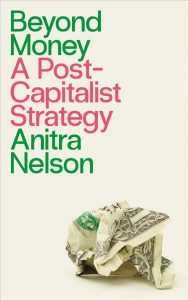In Beyond Money: A Postcapitalist Strategy, Anitra Nelson makes the case for abolishing money to achieve a truly postcapitalist future and explores how societies without money might be organised in everyday life. Through its expansive coverage and imaginative connections, this inspiring book encourages us to ponder why it might be ‘easier to imagine the end of the world than the end of money’, writes Leslie Sklair.
Beyond Money: A Postcapitalist Strategy. Anitra Nelson. Pluto Press. 2022.
 This inspiring book is the latest in a series of publications by the Australian political economist Anitra Nelson. Beyond Money focuses on two fundamental interrelated queries and musters its evidence in exploring the many questions that arise as a consequence. First: why should we even contemplate the idea that societies could be organised without money? Second: even if we did take the idea of societies without money seriously, how would these societies be organised in terms of everyday life?
This inspiring book is the latest in a series of publications by the Australian political economist Anitra Nelson. Beyond Money focuses on two fundamental interrelated queries and musters its evidence in exploring the many questions that arise as a consequence. First: why should we even contemplate the idea that societies could be organised without money? Second: even if we did take the idea of societies without money seriously, how would these societies be organised in terms of everyday life?
Nelson answers both questions succinctly and clearly: we need to abandon money in order to deal effectively with divisive economic, social and political inequalities and the unsustainability of the planet. Money, she demonstrates, generates inequality. She points out that the Soviet Union, Cuba and China in the twentieth century never represented ideally functioning socialism because they were ruled by elites who continued production for the market, even if in modified, state-planned ways. Money remained a tool of control, even in these nominally communist states.
In capitalist societies, ‘a citizen’s ‘‘social’’ contract with the capitalist state is a profoundly monetary one. Strong tensions arise because, although the national government is often regarded as apart from the market, it is actually a part of the market’ (5). As Nelson continues, ‘money, in this society, is the standout defining principle of what constitutes ‘‘work’’ within capitalism. ‘‘I don’t have any work’’, generally means ‘‘I can’t find a paid job’’ rather than ‘‘I can’t be purposively active’’’ (18).
In a collection of chapters that sometimes range into surprising territories, Nelson brings together interconnecting arguments to answer the question: what would a society without money look like? Nelson’s answer is outlined in Chapter Three, intriguingly entitled ‘Yenomon: Commoning’. The book contains a glossary, in which Yenomon (‘no money’ backwards) is explained as ‘a fictionalised but, arguably, plausible and feasible nonmonetary postcapitalist local–global commons, based on communing and a community mode of production’. (For an earlier, equally utopian, proposal that has much in common with ‘Yenomon’, see my idea of Producer-Consumer cooperatives in Chapter Eleven of Second Thoughts on Capitalism and the State.)
Nelson’s chapter on Yenomon provides a wealth of detail on what many readers may see as a utopian community for our times. She argues: ‘Instead of the old unreal, abstract ‘‘exchange value’’ and ‘‘money’’, in Yenomon we perceive and approach the world using ‘‘real values’’. Real values go beyond simple utilitarian meanings of a ‘‘use value’’ to incorporate all those environmental and social qualities and quantities that comprise the needs of both people and planet […] It doesn’t take up much time. Tasks aren’t onerous’ (55). Some readers might dismiss this as utopian fantasy, and most farmers might be skeptical about the claim that ‘tasks aren’t onerous’, especially where food security is an issue.
Yet, underpinning all the mundane detail on Yenomon is the argument that money, far from enabling social relations, cruelly poisons them. While abolishing the use of money might seem impossible and impractical, suggestions that money can be a force for progressive social change are even more nonsensical. Why, Nelson argues, have a ‘money’ that doesn’t function like money as we know it? If capitalist practices and unequal exchange are essential characteristics of money, the logical conclusion is to abolish money altogether.
 Image Credit: Crop of ‘ground dollar’ by Greg Dunlap licensed under CC BY 2.0
Image Credit: Crop of ‘ground dollar’ by Greg Dunlap licensed under CC BY 2.0
In this reviewer’s opinion, the most important argument in the book is the very sharp critical analysis of the approach of most ‘leftists’ to the question of money. Nelson opens her first chapter with the powerful statement that money as we know it is capitalism’s sine qua non, its essence, arguing that we cannot describe or define either capitalism, capitalist management or capitalist work without recourse to money.
Many on the Left argue that just because capitalism relies on money, money might not always lead to capitalism, thus the real problem is capital and/or commodification. Nelson shows that these positions are typical among leftists, environmentalists and anti-capitalist theorists and movements today. Consequently, modified forms of money and markets are included or inferred in practically all visions of postcapitalism. This book refutes the argument that we could mould money to progressive ends.
Where, readers might wonder, do these ideas come from? Avoiding the common practice of scholars presenting themselves as abstracted entities, Nelson provides a good deal of autobiographical material. At the very beginning of the book she clarifies her own intellectual and political roots, explaining that she chose an interdisciplinary study of Karl Marx’s concept of money for her PhD thesis. This was ‘a cover for a grand investigation into as many theories of money as I could digest. After all, you really need to understand something thoroughly before you dismiss it – especially money, the secular quasi-god of the world I had been forced to inhabit, capitalism.’ She tells how she discovered ‘nonmarket socialist’ thinking in the 1990s, not so much as a home or ideology, more as a ‘thread of heretical questioners of my own ilk’.
Immersing herself in the enormous, often contentious, literature on money, she explains how Werner Sombart, Max Weber and Joseph Schumpeter all highlighted the role of double-entry bookkeeping in introducing and maintaining capitalist reasoning, culture and material practices. The result of these investigations, from her critical perspective, is that we need to do away with money, not simply capital. Unless postcapitalism is money-free, we will fail to establish a world beyond capitalism. If money is the strategic organising principle of capitalism, then no money, no capitalists. (Peter Hudis adds more layers to this argument in Marx’s Concept of the Alternative to Capitalism.)
Nelson takes several celebrated leftist theorists to task for encouraging the illusion that the role of money in capitalist society could be reformed to create a more socialist society. For example, she engages with the late Eric Olin Wright and Alf Hornborg, anti-capitalist theorists of postcapitalism who could not imagine a society without money. Hornborg’s ‘postcapitalism’, Nelson points out, retains wage labour, entrepreneurs, taxes and banking.
She is somewhat more sympathetic to the work of Marx and John Bellamy Foster, skillfully making connections between ecofeminist analyses of nature and the unpaid labour of women (and men) in all contemporary societies. She points out that nature is ignored in as much as the object of Marx’s analysis are capitalist practices and relations of production. However, she is careful to explain that this is not because Marx did not believe that nature, or women, did valuable work, but that ordinary, everyday market practices conspire to denigrate both. The same is true for anyone, man or woman, doing any kind of unpaid work.
This point is illustrated via the ‘iceberg economy’ metaphor of Maria Mies: the tip of the iceberg conceals the larger mass of unaccounted-for contributions to value made by women’s unpaid housework, the work of subsistence peasants, the work done under colonised conditions and nature’s production. Central features of this argument are the ideas of the ‘logic of care’ and the ‘ethics of care’ being at the base of the economy: features that are paid lip service in capitalist society but are founding principles of Yenomon. In this context, Nelson declares that ‘women have a tendency to be utopian in distinctive, nurturing, ways’, a sentiment that might appear essentialist to some.
A notable feature of Beyond Money is Nelson’s expansive coverage of many neglected topics and her ability to make connections between the usually negative impact of money culture and almost everything else. This is evident from her sections on Indigenous communities in Australia, the Zapatistas, the Rojava and bottom-up social movements during the Spanish Civil War. What these have in common is the vision of creating non-monetary, socially fair, just and ecologically sustainable postcapitalisms. In a striking comment on our times, she remarks: ‘We have had the good fortune to be born on planet Earth but the misfortune to be born at a point in history when most societies globally are dominated by capitalist practices and monetary dynamics.’ One point that might leave some readers baffled is that the controversial concept of ‘the Anthropocene’ is mentioned in passing, but nowhere properly explained.
Nelson’s singular achievement in this book is to make connections between the abstract and the concrete and between the local and the planetary, seeking out communities whose voices are rarely heard. With Beyond Money, she may well have rewritten the thought-provoking aphorism ‘it is easier to imagine the end of the world than to imagine the end of capitalism’ – instead encouraging us to ponder why ‘it is easier to imagine the end of the world than the end of money’.
- This review first appeared at LSE Review of Books.
Please read our comments policy before commenting.
Note: This article gives the views of the author, and not the position of USAPP – American Politics and Policy, nor of the London School of Economics.
Shortened URL for this post: https://bit.ly/3Lsl2Tx
About the reviewer
Leslie Sklair – LSE Department of Sociology
Leslie Sklair is an emeritus professor of sociology at LSE. Best known for his books on globalisation and the transnational capitalist class, he is now researching full-time on the ideological aspects of the Anthropocene in a planet dominated and despoiled by capitalist globalisation.






